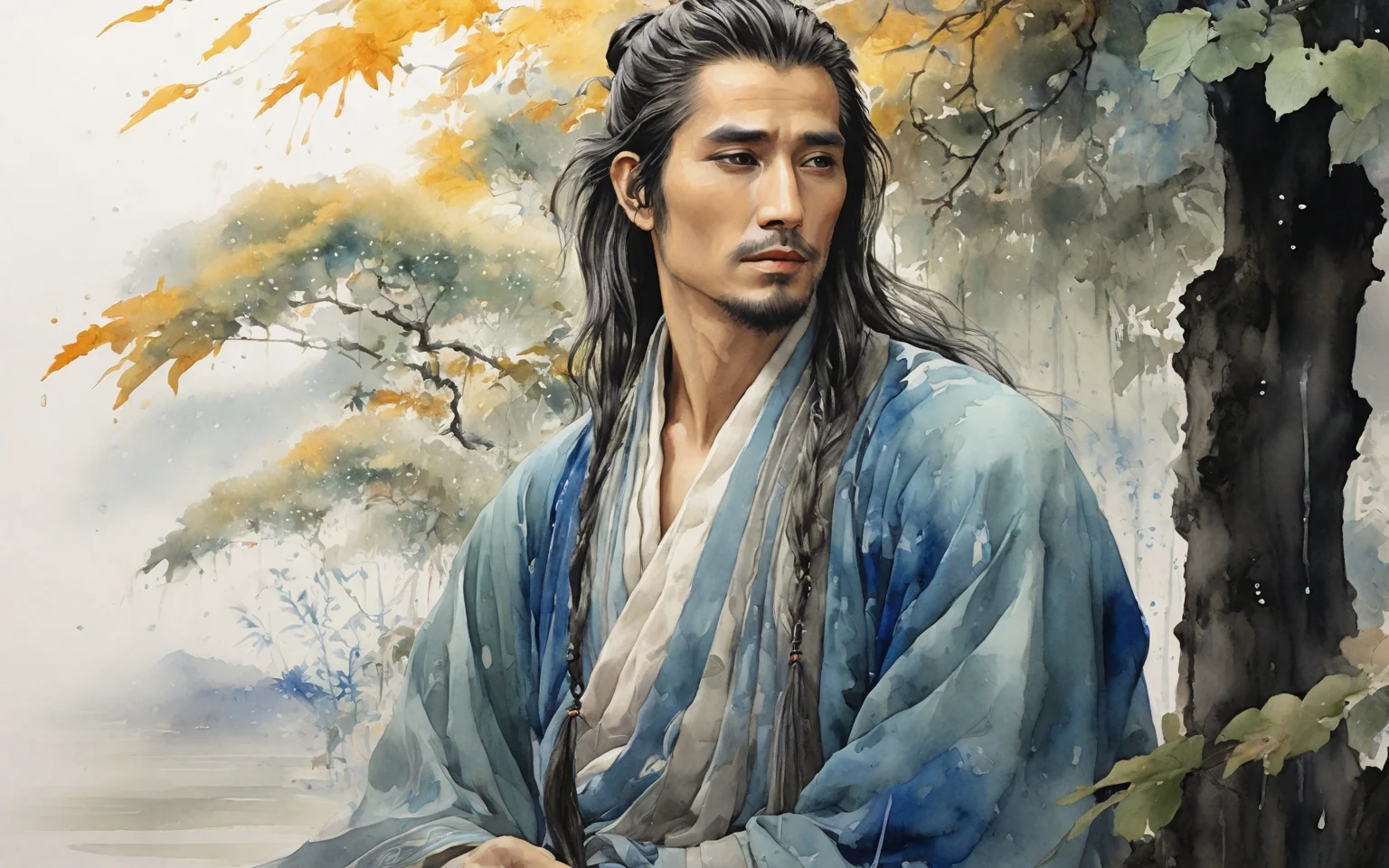On River Han my home thoughts fly,
Bookworm with worldly ways in fright.
The cloud and I share the vast sky;
I'm lonely as the moon all night.
My heart won't sink with sinking sun;
West wind blows my illness away.
A jaded horse may not have done,
Though it cannot go a long way.
Original Poem:
「江汉」
杜甫
江汉思归客,乾坤一腐儒。
片云天共远,永夜月同孤。
落日心犹壮,秋风病欲苏。
古来存老马,不必取长途。
Interpretation:
The third year of the Dali era (768) found Du Fu drifting along the Yangtze and Han rivers, unable to return north and struggling to sustain himself. At this time, he deeply felt the weight of old age and the impossibility of returning home, while the external hardships remained unchanged. In this poem, he expresses his unwillingness to succumb to aging and his unyielding spirit, showcasing resilience and perseverance in the face of adversity.
First Couplet: “江汉思归客,乾坤一腐儒。”
(Drifting along the Yangtze and Han rivers, longing to return home yet unable, I am but an old, pedantic scholar lost in this vast world.)
Here, the poet self-deprecatingly describes his situation. The Yangtze and Han rivers symbolize his wandering and separation, while "a guest longing to return" highlights his prolonged absence from home and the helplessness of being unable to return. Though the term "pedantic scholar" carries a sense of self-mockery, it also subtly conveys his unwavering loyalty and steadfastness despite his hardships.
Second Couplet: “片云天共远,永夜月同孤。”
(Watching a drifting cloud float far into the sky, and a lone moon hanging in the endless night, I feel as distant as the cloud and as solitary as the moon.)
Through imagery, Du Fu vividly captures his sense of solitude and sorrow. The drifting cloud and lone moon not only create a melancholic atmosphere but also serve as metaphors for his wandering and longing for home. This interplay between nature and emotion deepens the poem’s sentimental tone.
Third Couplet: “落日心犹壮,秋风病欲苏。”
(Though the setting sun reminds me of my dwindling days, my heart still holds ambition; as the autumn wind stirs, I feel a faint recovery from my illness.)
This couplet portrays the poet’s resilience. Though physically frail and aged, his inner ambition remains strong. The autumn wind, often symbolic of decline, here paradoxically suggests a sense of renewal, reflecting his indomitable spirit despite adversity.
Final Couplet: “古来存老马,不必取长途。”
(Since ancient times, old horses have been valued not for their strength but for their wisdom. Likewise, though I am aged, I still have something to offer.)
Du Fu employs the “old horse knows the way” idiom to compare himself to an aging yet wise steed. He emphasizes that even in old age, wisdom and experience remain valuable, subtly expressing his desire to contribute despite his declining health.
Writing Characteristics:
This poem skillfully blends metaphor and symbolism, intertwining natural imagery with personal sentiment. The “drifting cloud” and “lone moon” visually convey his loneliness, while the metaphor of the “old horse” asserts his self-worth despite aging. The poet’s emotions fluctuate between despair and resilience, culminating in a profound expression of determination and hope.
Overall Appreciation:
The poem revolves around the theme of perseverance in adversity. Du Fu’s wandering along the Yangtze is not just a physical exile but also an emotional one. Despite his struggles, he remains steadfast in his ideals. By contrasting personal hardships with the vastness of the world, he highlights his unyielding spirit. The poem is deeply introspective, yet it also reflects broader existential struggles.
Insights:
This poem conveys a powerful message about resilience and the value of wisdom in old age. Despite facing illness, poverty, and exile, Du Fu refuses to succumb to despair. His words serve as a timeless reminder that even in adversity, one’s inner strength and experience can still make a meaningful impact. It inspires us to embrace challenges with fortitude and to find purpose beyond physical limitations.
Poem translator:
Xu Yuan-chong (许渊冲)
About the poet

Du Fu (杜甫), 712 - 770 AD, was a great poet of the Tang Dynasty, known as the "Sage of Poetry". Born into a declining bureaucratic family, Du Fu had a rough life, and his turbulent and dislocated life made him keenly aware of the plight of the masses. Therefore, his poems were always closely related to the current affairs, reflecting the social life of that era in a more comprehensive way, with profound thoughts and a broad realm. In his poetic art, he was able to combine many styles, forming a unique style of "profound and thick", and becoming a great realist poet in the history of China.












